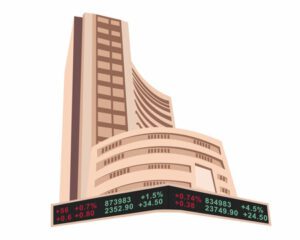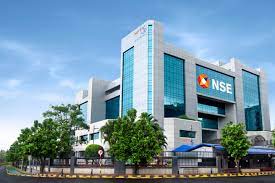Welcome Knowtostock.com,In this article we will learn in detail about what is sensex and nifty.Nowadays people are curious to know about stock/share market,BSE,NSE,SENSEX,NIFTY etc.
Table of Contents
ToggleI will cover every point step by step that is necessary for every beginner to know about.Its up to you what information you are searching for.
What is stock/share market?
- The share market, or stock market, is a place where people buy and sell ownership in companies. When you own a share (or stock) of a company, you own a small piece of that company.
- Companies sell shares to the public to raise money, and investors buy these shares in the hope that the company will do well, and the value of their shares will increase over time.
- People trade these shares on stock exchanges, like a marketplace for buying and selling ownership in companies. The prices of shares can go up or down based on factors like how well the company is doing, economic conditions, and what investors think about the company’s future.
Let’s take a simple example:
Imagine there’s a company called ABC Inc. This company decides to raise money to expand its business. To do this, ABC Inc. divides itself into smaller pieces called shares. Each share represents a tiny ownership stake in the company.
Now, ABC Inc. decides to sell these shares to the public through the stock market. Investors who think ABC Inc. is going to do well might buy these shares.
Let’s say you decide to buy 10 shares of ABC Inc. for $10 each. You’ve just become a shareholder in ABC Inc. If the company does well and its profits increase, the value of your shares might go up. So, if the share price increases to $15, and you decide to sell your shares, you would make a profit of $5 per share ($15 selling price – $10 buying price).
On the other hand, if the company faces problems and its prospects don’t look good, the share price might fall. If it drops to $5 per share, and you sell your shares, you would incur a loss of $5 per share.
In summary, the stock market is like a marketplace where people buy and sell ownership in companies, and the value of these ownership shares can change based on how well the companies are doing and what investors think will happen in the future. What is Sensex and Nifty?
What is Sensex and Nifty?
We will discuss in detail about what is sensex and nifty indidually in further articles:-
SENSEX :-
The Sensex, or the S&P BSE Sensex, is a stock market index that measures the performance of the Bombay Stock Exchange (BSE). It represents the weighted average of 30 of the largest and most actively traded stocks on the BSE. The term “Sensex” is a blend of the words “Sensitive” and “Index.”
I’d be happy to provide more detail about the Sensex.
What is Sensex?
-
- The Sensex comprises 30 of the largest and most liquid stocks listed on the BSE. These companies represent various sectors of the Indian economy.
- Calculation:
- The Sensex is calculated using the free-float market capitalization methodology. This means that the index considers only the portion of shares that are available for trading in the market, excluding locked-in shares and shares held by promoters.
- Base Year and Base Value:
- The Sensex has a base year and a base value. The base year is 1978-79, and the base value is set at 100. The index value is calculated by dividing the current market value of the index by the base value and then multiplying by 100.
- Weighted Average:
- The index is a weighted average, meaning that companies with higher market capitalization have a greater impact on the index’s value. This ensures that larger companies play a more significant role in determining the index movements.
- Sectoral Representation:
- The Sensex aims to represent a broad spectrum of sectors in the Indian economy, including finance, information technology, healthcare, energy, and more. This sectoral representation provides a comprehensive view of the overall market performance.
- Market Representation:
- The Sensex is considered a barometer of the Indian stock market. Movements in the Sensex are closely watched by investors, analysts, and policymakers to gauge the overall health and direction of the market.
Significance of Sensex:
- Economic Indicator:
- The Sensex is often regarded as a key economic indicator for India. Changes in the index are reflective of the market sentiment, investor confidence, and the overall economic environment.
- Benchmark:
- The Sensex serves as a benchmark against which the performance of individual stocks, mutual funds, and other investment portfolios can be compared.
- Investor Sentiment:
- Fluctuations in the Sensex can impact investor sentiment. A rising Sensex generally indicates positive market conditions, while a declining Sensex may signal concerns among investors.
- Global Recognition:
- The Sensex is widely recognized globally and is often cited in international financial news as a measure of the Indian stock market’s performance.
 Investors and analysts use the Sensex as a tool for market analysis, investment decision-making, and assessing overall economic conditions in India. It’s important to note that while the Sensex is a significant indicator, it represents only a portion of the entire stock market, and other indices, such as Nifty, also play crucial roles in providing a comprehensive view of the Indian stock market.
Investors and analysts use the Sensex as a tool for market analysis, investment decision-making, and assessing overall economic conditions in India. It’s important to note that while the Sensex is a significant indicator, it represents only a portion of the entire stock market, and other indices, such as Nifty, also play crucial roles in providing a comprehensive view of the Indian stock market.
.
NIFTY :-
“Nifty” typically refers to the National Stock Exchange Fifty, commonly known as Nifty 50. Nifty is the flagship stock market index of the National Stock Exchange of India (NSE). It is one of the most widely tracked equity indices in India and serves as a benchmark for the Indian stock market.
Here are some key points about Nifty:
Composition:
- Number of Stocks:
- Nifty 50 comprises 50 actively traded stocks listed on the NSE.
- These stocks are selected based on various criteria, including market capitalization, liquidity, and other financial parameters.
- Sectoral Representation:
- The index is designed to represent various sectors of the Indian economy.
- It includes stocks from sectors such as banking, information technology, pharmaceuticals, automotive, energy, and more.
Calculation:
- Free Float Market Capitalization Weighted:
- Nifty is a market capitalization-weighted index, where the level of the index reflects the total market value of all the stocks relative to a particular base period.
- The index is free float market capitalization-weighted, meaning it considers only the free float or the readily tradable portion of a company’s outstanding shares.
- Base Year and Value:
- The base period for the Nifty calculation is November 3, 1995, with a base value of 1,000.
- Any change in the constituents of the index or the base period is adjusted to maintain continuity in the index values.
Importance:
- Benchmark for Indian Stock Market:
- Nifty is widely used as a benchmark to assess the performance of the Indian stock market.
- It serves as a reference point for fund managers, investors, and traders to gauge the overall market sentiment and trends.
- Investment Products:
- Various financial products, such as index funds and exchange-traded funds (ETFs), are based on the Nifty 50 index.
- These investment products allow investors to gain exposure to the entire basket of Nifty stocks without having to buy each stock individually.
Nifty Next 50:
- Extension of Nifty 50:
- Nifty Next 50, or Nifty 100, comprises the 51st to 100th stocks by free float market capitalization on the NSE.
- It is often considered a broader representation of the market beyond the top 50 stocks.
 Nifty is a crucial indicator of the Indian stock market’s health and performance. It provides valuable insights for investors, traders, and financial analysts, making it an integral part of India’s financial landscape.I think you have understood that what is sensex and nifty really.
Nifty is a crucial indicator of the Indian stock market’s health and performance. It provides valuable insights for investors, traders, and financial analysts, making it an integral part of India’s financial landscape.I think you have understood that what is sensex and nifty really.
Difference between SENSEX and NIFTY :-
The Bombay Stock Exchange (BSE) and the National Stock Exchange (NSE) are the two major stock exchanges in India. While both serve the primary purpose of facilitating the buying and selling of securities, they differ in various aspects. Here are the key differences between BSE and NSE:
1. Establishment:
- BSE (Bombay Stock Exchange): Established in 1875, it is the oldest stock exchange in Asia.
- NSE (National Stock Exchange): Established in 1992, it is relatively newer compared to BSE.
2. Location:
- BSE: Headquartered in Mumbai, Maharashtra.
- NSE: Also headquartered in Mumbai, Maharashtra.
3. Ownership and Governance:
- BSE: Originally an association of brokers, it converted into a corporatized and demutualized entity in 2005.
- NSE: A corporatized and demutualized exchange from its inception.
4. Indices:
- BSE: The BSE Sensex is the key benchmark index, consisting of 30 stocks representing various sectors.
- NSE: The Nifty 50 is the main benchmark index, comprising 50 actively traded stocks across different sectors.
5. Trading System:
- BSE: Earlier used an open-outcry system, but it has transitioned to an electronic trading platform known as BOLT (BSE OnLine Trading) system.
- NSE: Introduced electronic trading from its inception, and it is known for its high-speed and technologically advanced trading platform.
6. Market Share:
- BSE: Historically, it had a dominant position in the market, but the NSE gained prominence, especially with the introduction of electronic trading.
- NSE: Currently, it holds a larger market share in terms of trading volumes and turnover.
7. Listing:
- BSE: Many companies, including some of the oldest and well-established ones, are listed on BSE.
- NSE: Also has a significant number of listed companies, and it is particularly attractive to newer, technology-driven firms.
8. Indices Beyond Benchmark:
- BSE: Apart from Sensex, BSE has various other indices, including sectoral indices and the BSE 100.
- NSE: Besides Nifty, it has a range of other indices such as Nifty Bank, Nifty Midcap, and sector-specific indices.
9. Derivatives Trading:
- BSE: Engages in derivatives trading, but its derivatives segment is not as extensive as NSE.
- NSE: It is a leader in the derivatives segment, providing a wide range of derivative products.
10. Global Recognition:
- BSE: Has a long history and is recognized globally as one of the oldest stock exchanges.
- NSE: Gained recognition for its modern infrastructure and technology-driven approach.
How To Earn From Strock Market?
A demat account, or dematerialized account, is a crucial electronic platform for holding and trading securities in financial markets. It replaces the traditional method of physical certificates with an electronic ledger, enhancing the efficiency and security of transactions. Investors utilize demat accounts to buy and sell stocks, bonds, and mutual funds electronically through authorized depository participants.
This digital format eliminates the risks associated with physical certificates, providing a secure and transparent means to manage investments. Furthermore, demat accounts streamline processes such as ownership transfers and the receipt of dividends, contributing to a more eco-friendly financial system by reducing reliance on paper. In essence, demat accounts have become an integral tool for modern investors, offering convenience, security, and efficiency in the dynamic landscape of financial markets.
For example,
consider an investor named Sarah who wants to buy 100 shares of a technology company. Instead of dealing with physical share certificates, Sarah opens a demat account with a depository participant (DP). She instructs her broker to purchase the shares, and upon completion of the transaction, the ownership is electronically transferred to her demat account.
Subsequently, if Sarah decides to sell some or all of her shares, she can do so through her demat account. The electronic platform facilitates a seamless process, and the ownership transfer occurs electronically, without the need for physical paperwork.
Additionally, when the technology company declares dividends, the payments are directly credited to Sarah’s demat account. This eliminates the delays and paperwork associated with receiving dividend cheques in the traditional system.
How to open demate account?
There are many applications that provide demat account but there are 3 most popular applications in india.To open demat account simply click on the link:-
- Upstox : Opening account is free.
- Zerodha : Account opening charge is 300Rs.
- Angel One : Opening account is free.
FAQ:
1. what is Index in stock market?
An index is like a scorecard for a group of things, such as stocks, bonds, or commodities. It helps us see how well that group is doing over time. For example, imagine you have a list of your favorite fruits, and you want to know how the overall taste changes each week. You could create a “fruit happiness index” to measure this.
2.What is difference b/w sensex and nifty?
Sensex and Nifty are major stock market indices in India. Sensex, managed by BSE, consists of 30 companies. Nifty, managed by NSE, comprises 50 companies. They reflect market performance, but differ in stock composition, stock exchange affiliation, and methodology, providing investors with diverse insights into the Indian market.
Sensex and Nifty are key benchmarks for the Indian stock market, serving as indicators of market trends. Investors use them for decision-making, and they play a crucial role in measuring economic health, acting as benchmarks for funds and influencing global perceptions of India’s financial stability.

 What is Sensex and Nifty?
What is Sensex and Nifty?
Great content I really enjoyed this post! ❤️
Great content I really enjoyed this post! ❤️
You have remarked very interesting details! ps decent internet site.Raise range